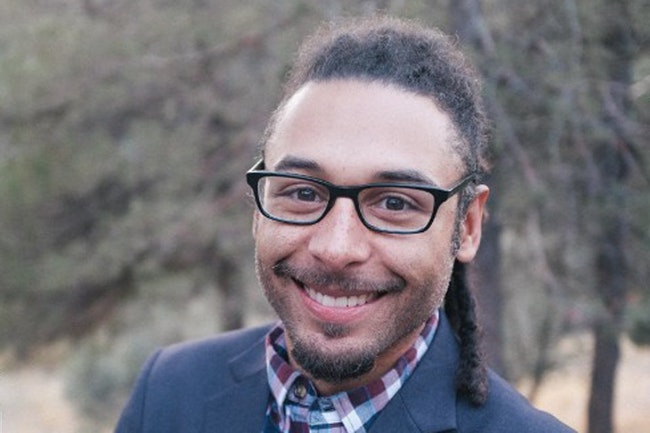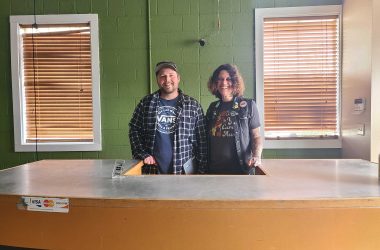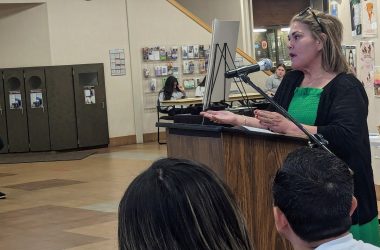 Zachary Stocks, the first executive director of Oregon Black Pioneers (Courtesy/Oregon Black Pioneers)
Zachary Stocks, the first executive director of Oregon Black Pioneers (Courtesy/Oregon Black Pioneers)
For more than 20 years, a small group of volunteers has worked to find historical records of Black Oregonians scattered across the state.
They’ve documented hundreds of lawyers, distance runners, miners and foresters in nearly every county in the state. But those records are mostly confined to filing cabinets in the Oregon Black Pioneers’ Salem office.
“Right now, the only way to know anything about them is to reach out to us,” said Zachary Stocks, the group’s executive director.
Stocks is working to change that.
He’s the first executive director and first paid staff member for the nonprofit organization, which seeks to tell a more complete story of Oregon’s history.
Founded in 1993 by several Black Salem residents, including the late Sen. Jackie Winters, Oregon Black Pioneers has been a labor of love for board members, who have worked tirelessly to gather and verify information and put together exhibits about chapters in Oregon history.
“We have been kind of maxed out with what you can accomplish with an all-volunteer board,” said Willie Richardson, the group’s president.
The group received a $21,600 grant from the Oregon Cultural Trust last year to hire a part-time director for two years. Stocks has worked in museums and historical nonprofits in the Pacific Northwest for about a decade and advocated for equity within the museum field. He said the job felt tailor-made for him.
“I had a personal responsibility to make sure it could be successful,” he said of the Black Pioneers. His career goal was to move into a leadership role, and he’s had a longstanding interest in both Black history and Pacific Northwest History.
Originally from Virginia, Stocks completed a master’s degree in museology at the University of Washington and was the visitor services manager at Northwest African American Museum in Seattle. He now lives in Astoria, where he plans to remain, with occasional trips to Salem.
Richardson said the board was excited to find a director with experience in both nonprofit management and Black history.
“He comes with that passion and that interest and that makes us fortunate,” she said.
Stocks said he has two priorities for Oregon Black Pioneers: research the names of Black Oregonians who have come to the organization’s attention to learn more about their lives, and digitize records so anyone can access information about them online.
“We have tons of references to various African-American historical figures who have contributed to the history and culture of the state,” he said. “Some of those things are as brief as names included in a copy of the Census record but others are more detailed descriptions of their work or the names of their spouses, the places where they lived, the kinds of industries that they’re part of.”
Richardson said the group has applied for a grant for an online museum and hopes to have it functional by early 2022.
“We have a lot of people who are interested in Oregon’s African-American history but it’s not in a central place we can find it,” Richardson said. In recent years, the Black Pioneers have spent much of their time organizing information for museum exhibits, she said. Now, with Stocks on board, the group’s leadership wants to move the focus back to gathering more in-depth information about the Black Oregonians they know existed.
Stocks said he’s uncovered several intriguing stories of Black Oregonians during his first weeks with the Black Pioneers. They include Toby Cotton Jr., a man raised in Portland and Gilliam County before his blacksmith father moved the family to Los Angeles. When Cotton’s father was injured on the job, the young man entered a footrace across the U.S. in hopes of raising money for the family. Though he didn’t win, at 15, Cotton remains the youngest person known to have run across the country, Stocks said.
Stocks said Oregon’s racist history of Black exclusion laws has gotten more recognition from the general public in recent years, and especially now as the Minneapolis police killing of George Floyd has prompted renewed discussion about racism in all facets of American life.
Those laws, written into the state’s original constitution, explain why Oregon remains a very white state to this day, he said. About 2% of Oregonians self-identified as Black according to 2019 Census data.
But Stocks said the community has always been geographically diverse, with Black Oregonians living in logging camps in Wallowa County, pushing for integrated schools in Coos Bay and settling in the Salem area.
“While our population might be small, the stories are really rich and compelling and inspiring. People made a life for themselves in a place where they were not welcome and Black Oregonians today are receiving the benefit of their sacrifice,” he said.
SUPPORT ESSENTIAL REPORTING FOR SALEM – A subscription starts at $5 a month for around-the-clock access to stories and email alerts sent directly to you. Your support matters. Go HERE.
Contact reporter Rachel Alexander: [email protected] or 503-575-1241.









